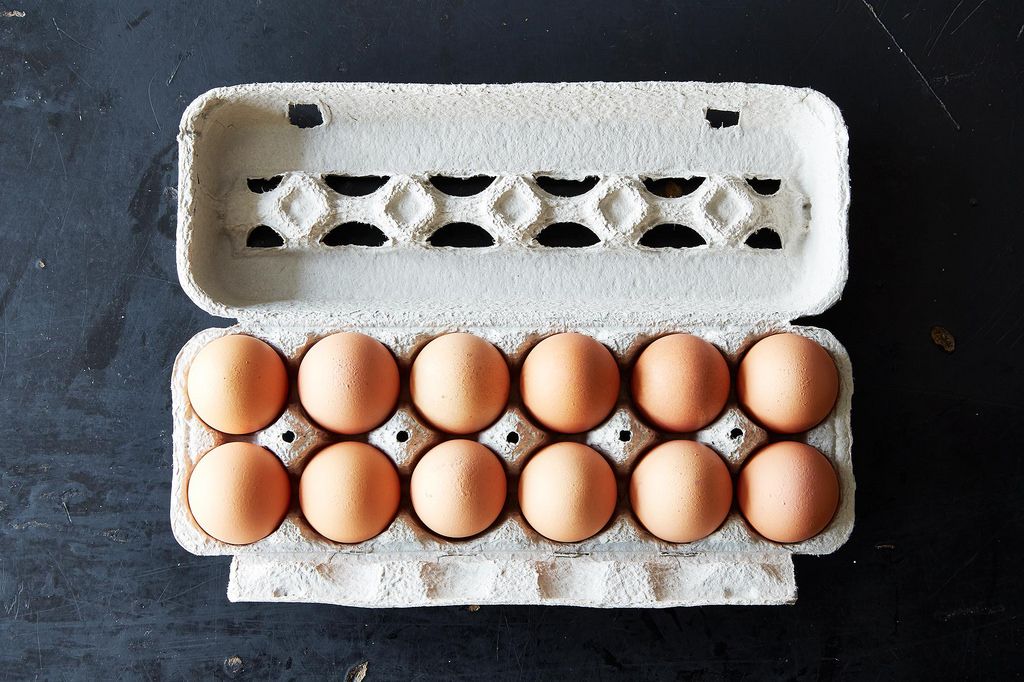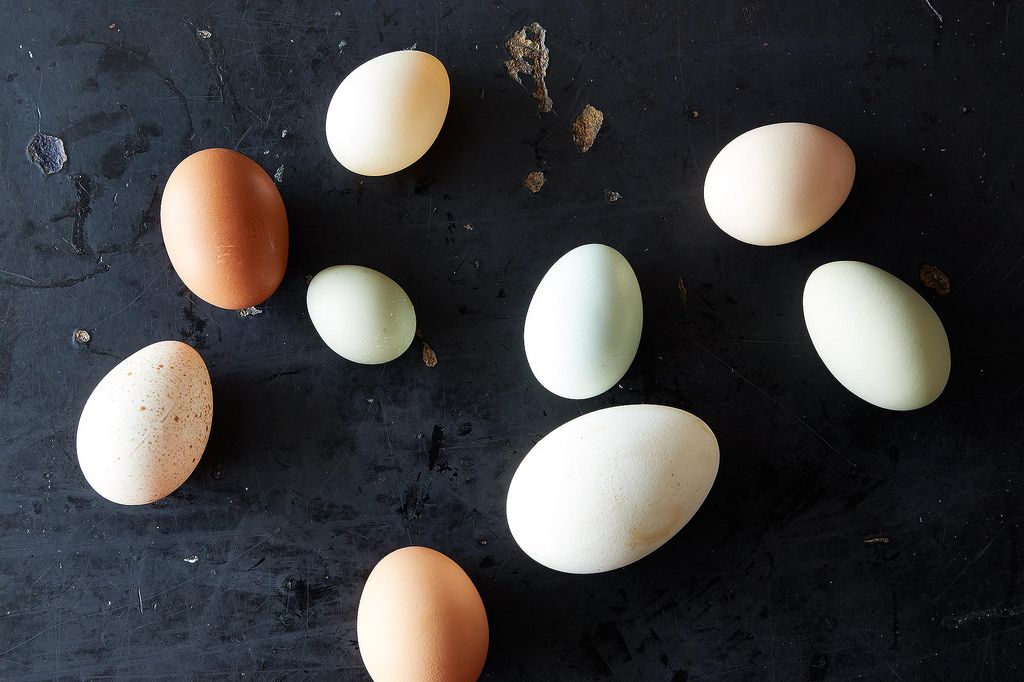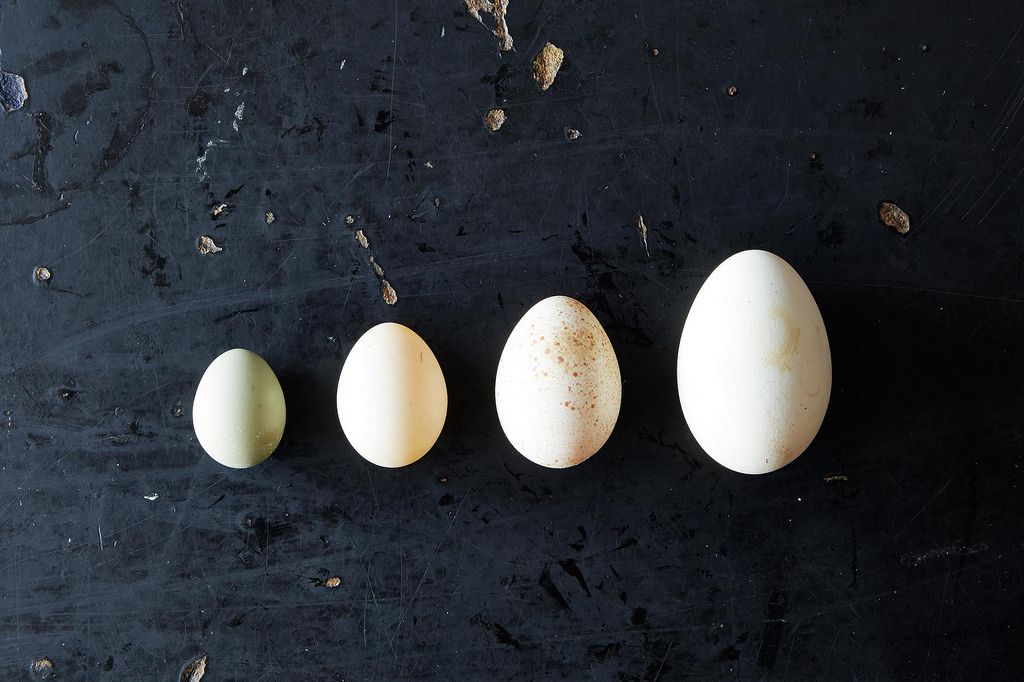Popular on Food52
20 Comments
Kay
June 9, 2021
I am looking for white free range or pastured Eggs. Brown eggs are not candled. I dispose of eggs with blood spots. Where can I get white free range or pastured eggs ? If a organic also it doesn't matter. I use a lot of eggs and disposing of 2 is disposing of 2 to 4 eggs per dozen Is a waste of Money and eggs.
Sandra
June 23, 2015
Fresh unprocessed eggs do not have to be refrigerated because the cuticle is intact and protects the egg. Eggs in the US have to be refrigerated because the commercial egg factories use cleaners (sometimes bleach) that strip the cuticle away leaving the egg unprotected. The only "free range" chickens are the ones owned by individuals. Free range in commercial egg production means they open the door for an hour daily. The chickens don't get to actually go outside. These terms (free range, organic, cage free) are all BS in commercial egg companies. Go read the government requirements to be able to call your eggs any of these terms. My chickens are free range. The ONLY time they are in their coop is at night and that is just for their safety. We have mountain lions, raccoons, snakes, etc. that come around at night and try to get the chickens. As soon as the sun is up, 6:38am this morning, we open the coop door and they come running out and spend the ENTIRE day outside on the 20 acres eating grass, bugs, etc. My chickens are very well cared for, very spoiled and very loved pets, that is the way it is supposed to be. My chickens are happy and healthy. They are not ever placed in any kind of cage or contained in a small area. Their coop is HUGE and only used at night. Shame on the people that cram these awesome birds into tiny cages.
peter
June 9, 2015
i have 4 hens that i hatched in my living room. they are 2 yrs old now. i get about 22 eggs per week............3 lay blue eggs and 1 lays brown.........lov'em
b S.
May 26, 2014
I have chickens that run free in the summer...too cold in winter here. happy chickens make lovely deep orange yolks. mmmm. not a lot of people around my area like free run chicken eggs but :D more for me :P
Tom O.
May 16, 2014
I've done some research on eggs and found that just because an egg carton says, "Cage Free" doesn't mean they're safe eggs in my opinion. The best eggs are home grown. The second best are eggs bought from a personal friend or neighbor and lastly hatchery's or egg farmers that practice Humane Animal Farm Care. This is the most important fact for me. Seems Whole Foods it the only place I can get eggs of this quality. Egg Innovations is the most economical at around 4 dollars for a dozen. To me it’s worth the extra dollar for a high quality eggs that the farmer took the time to raise healthy hens. These farmers are pretty easy to spot because of the stamp (HAFC) on the packaging.
Gaia G.
May 15, 2014
I'm sharing this with my followers. Thank you so much for posting. I usually buy the pasture-raised, anti-biotic free, organic eggs. They are quite pricey, but they'll save me a ton in medical expenses down the road.
anne
May 12, 2014
I believe when buying eggs, you should always purchase the "pasture raised" carton. Cage free, well, not living in a cage doesn't mean they have space or that they are outdoors, and most commercial hens are kept in row after row after row of cramped barracks in a large warehouse, and never see the outdoors. Pasture raised hens spend time, well, in a pasture. They are pricey, but well worth it.
Judy
May 9, 2014
When I was a child, we had chickens and did not refrigerate the eggs. Of course, we used them pretty quickly. I only buy cage free eggs.
Ellen
May 8, 2014
Feathers are not the indicator to look to see whether or not a hen will lay white or brown eggs. It mostly depends on the color of their ear lobes (though there are exceptions). There are brown feathered chickens that lay white eggs and white feathered ones that lay brown eggs. It just depends on the breed.
ATG117
May 8, 2014
I'm still trying to figure out why farm raised eggs so often have blood spots in them.
MRubenzahl
May 8, 2014
I believe that blood spots usually come from young, immature chickens. During commercial processing, the eggs are "candled" -- a very bright light is projected through the egg, allowing blood spots and other defects to be screened out.
MRubenzahl
May 8, 2014
I looked it up. Blood spots can occur any time, more likely when chicken is very young or very old. Confirmed that candling (and electronic scanning) are why you don't see them in mass-produced eggs.
By the way, they are safe to eat. Just remove the spot using a spoon and a knife.
By the way, they are safe to eat. Just remove the spot using a spoon and a knife.
Liz B.
May 8, 2014
Awesome to see a post about eggs, an everyday occurrence in my diet. Lately that's started to worry me, especially since I tend to eat them raw (like with natto, kimchi, and furikake over rice, for example). I am always sure to get the most fresh, organic, "natural" egg I can. Any words of advice here? I've been doing it for a long time but it's not every day I have an egg expert to consult!
http://thatumamilife.wordpress.com - a clean eating bento blog. Japanese or Asian-inspired!
http://thatumamilife.wordpress.com - a clean eating bento blog. Japanese or Asian-inspired!
Joy B.
May 8, 2014
Hi Liz! I am not, by any means, an "egg expert" -- but I would say there are some egg guidelines that I like to live by. "Natural," although a good start, doesn't necessarily mean anything in the egg industry, unfortunately. Instead, I always look for phrases like "Cage-free", "antibiotic-free", "certified organic" and ideally, "pasture-raised," or an indication that the eggs were sourced from a local farm. They are generally a bit pricier, but in my mind, it's so worth it. Hope this helps! I also love egg on natto :)
LucyS
May 8, 2014
You have to be kind of careful with phrases like 'free range', 'cage free' and 'pasture raised', though, because there isn't any regulation for what those mean. For example, 'cage-free' can mean that the birds aren't actually in a physical cage, but they're still packed into a very small space. I'm not sure it's a perfect solution, but I always look for the "certified humane" badge, because this is a closely regulated mark and indicates that certain standards have been met - and they have extra standards for including things like 'pasture-raised' on certified humane eggs (for example, if they are certified humane and also say pasture-raised, there has to actually be a pasture involved.) It helps to make sure that chickens that are theoretically free range are actually ranging freely - and (not that I'm a chicken expert) happy chickens are healthy chickens!
Uriah
May 8, 2014
There are actually a LOT of standards for what free range and pasture raised mean. Cage free is a BIT more complicated, as you note, but I work in the food production and grocery industry and I can assure you that those words aren't meaningless. "Natural" is, though. But some companies, like Whole Foods, have determined their own guidelines for what "natural" means which is posted on their website. Also, most grocery stores have a FAIRLY close relationship with their distributors and the farms those distributors get things from. If you have questions, just ask the grocery leadership at your local store if they can't answer your question. You may have to go through several rings of leadership (distributor, direct to the farmer, etc) but you'll get the information you want.
LucyS
May 8, 2014
I'm sure you're right, but do you have a link to what the free range/pasture range standards are? I'd love to see them! Thanks!




See what other Food52 readers are saying.